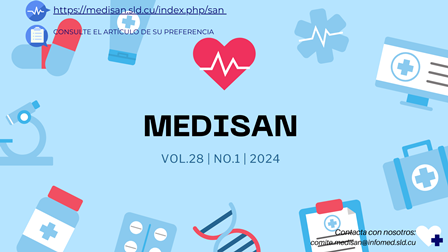Results of the Territorial Program “Development of products and health services”
Keywords:
research, health research evaluation, scientific research and technological development, applied research, health services research, technology and innovation management health sciences.Abstract
A science, technology and innovation program is a group of activities organized in projects that are related to each other, which objective is to solve a problem identified according to the priorities and directed to achieve results of specific impacts. In Santiago de Cuba province the Territorial Program "Development of products and health services" is in action since 2020, which has implemented 12 investigation projects. In this work the scientific-technical results are identified; also, it is considered that they respond to sectoral and territorial priorities and are in correspondence with the policy of the health sector and higher education in Cuba. Their introduction contributes to solve the health problems in the territory by means of the implementation of science and technological innovation for the diagnosis, treatment and rehabilitation of persons with diseases.
Downloads
References
2. Cuba. Ministerio de Justicia. Constitución de la República. La Habana: Ministerio de Justicia; 2019 [citado 01/06/2020]. Disponible en: https://siteal.iiep.unesco.org/sites/default/files/sit_accion_files/11168.pdf
3. Núñez Jover J, Ortiz Pérez HR, Proenza Díaz T, Rivas Diéguez A. Políticas de educación superior, ciencia, tecnología e innovación y desarrollo territorial: nuevas experiencias, nuevos enfoques. Revista Iberoamericana de Ciencia, Tecnología y Sociedad. 2020 [citado 06/10/2023];15(43):187-208. Disponible en: https://www.redalyc.org/articulo.oa?id=92463087010
4. Gómez Torres J, Cruz Díaz RO, Páez More M, González Rodríguez Y. Indicaciones metodológicas para la actividad de programas y proyectos de ciencia, tecnología e innovación. La Habana: CITMA; 2020 [citado 06/10/2023]. Disponible en: http://redciencia.cu/uploads/CITMA%20INDICACIONES%20METODOLOGICAS%20SPP.pdf
5. Portal Miranda JÁ, Corratge Delgado H, Vidal Ledo MJ. Objetivos, retos y prioridades del MINSAP, 2019. INFODIR. 2019 [citado 05/10/2023];15(29):138-42. Disponible en: https://www.medigraphic.com/pdfs/infodir/ifd-2019/ifd1929n.pdf
6. Cuba. Ministerio de Finanzas y Precios. Resolución 287/2019 “Reglamento para el Sistema de Programas y Proyectos de Ciencia, Tecnología e Innovación”. La Habana: Ministerio de Finanzas y Precios; 2019 [citado 01/06/2020]. Disponible en: https://www.gacetaoficial.gob.cu/sites/default/files/goc-2019-o86.pdf
7. de Armas Ramírez N, Marimón Carrazana JA, Guelmes Lorences González J, Perdomo Vázquez JM. Caracterización y diseño de resultados científicos como aportes de la investigación educativa. Congreso Internacional Pedagogía 2003. La Habana: Universidad Pedagógica Félix Varela; 2003.
8. Morales Suárez I. La ciencia y la innovación como componente estratégico para el cumplimiento de los programas de salud. INFODIR. 2020 [citado 05/10/2023];30(1):e694. Disponible en: https://revinfodir.sld.cu/index.php/infodir/article/download/694/849
9. León Díaz O, Pierra Conde A, García Cuevas JL, Fernández González A. La educación superior cubana en el escenario actual del sistema de ciencia, tecnología e innovación. Revista Universidad y Sociedad. 2021 [citado 05/10/2023];13(1):371-81. Disponible en: http://scielo.sld.cu/pdf/rus/v13n1/2218-3620-rus-13-01-371.pdf
10. Díaz-Canel Bermúdez M, García Cuevas JL. Educación superior, innovación y gestión de gobierno para el desarrollo 2012-2020. Ingeniería Industrial. 2020 [citado 05/10/2023];41(3):1-17. Disponible en: https://www.redalyc.org/journal/3604/360465197008/360465197008.pdf
11. Ramírez Hita S. Las investigaciones de salud pública en Latinoamérica. Reflexiones desde el Sur global. Rev Fac Nac Salud Pública. 2019 [citado 12/10/2023];37(1):106-13. Disponible en: http://www.scielo.org.co/pdf/rfnsp/v37n1/0120-386X-rfnsp-37-01-106.pdf
Published
How to Cite
Issue
Section
License
All the articles can be downloaded or read for free. The journal does not charge any amount of money to the authors for the reception, edition or the publication of the articles, making the whole process completely free. Medisan has no embargo period and it is published under the license of Creative Commons, International Non Commercial Recognition 4.0, which authorizes the copy, reproduction and the total or partial distribution of the articles in any format or platform, with the conditions of citing the source of information and not to be used for profitable purposes.





